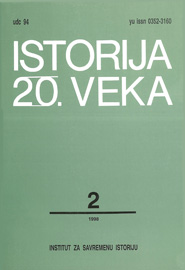RATNI ZLOČINI U JUGOSLAVIJI U DRUGOM SVETSKOM RATU - PROBLEM UTVRĐIVANJA
ESTABLISHING WAR CRIMES COMMITTED IN YUGOSLAVIA DURING WORLD WAR II
Author(s): Milan KoljaninSubject(s): Geography, Regional studies, Criminal Law, Recent History (1900 till today), Studies in violence and power, Demography and human biology, WW II and following years (1940 - 1949)
Published by: Institut za savremenu istoriju, Beograd
Keywords: Yugoslavia; WWII; war crimes; Serbia institutions;
Summary/Abstract: The accepted opinion in Yugoslav historiography has been that the State Committee for the Establishment of Enemy and Collaborator Crimes, formed on 30 November 1943 by decision of the revolutionary council in Jajce, was the only organized body collecting information about war crimes in Yugoslavia. This work identifies other institutions engaged in this search and shows their achievements. On German occupied territory in Serbia this was done by the Committee for Collecting Material Regarding the Loss of the Serbian Church and People of the Serbian Orthodox Church Patriarchate, and by the Commissariat for Refugees and Relocated Citizens. The work of the Yugoslav Royal Government in London on gathering information about crimes was particularly important, as was their communication of their findings to the governments of allied countries and to the international community. Representatives of the Yugoslav government took part at international meetings at which the establishing of war crimes and the persecution of their perpetrators was institutionalized, and new norms standardized in international law for the punishment of crimes of such dimensions as the world had never witnessed before. Along with the representatives of other allied countries, on 20 October 1943 the Yugoslav government participated in the founding in London of the United Nations Committee for the Investigation of War Crimes. The Yugoslav Committee for the Investigation of War Crimes was established on 27 January 1944 in Cairo. By the end of the year this committee gathered a considerable number of accusations against war criminals and sent them to the United Nations Committee. At the same time the Yugoslav Committee established contacts with the State Committee for the Establishment of Enemy and Collaborator Crimes, and in March 1945 became its representative in London. Besides the work on establishing war crimes the State Committee, as an organ of the revolutionary regime, played an important part in the properly transformation (confiscation), and in the political life of the country. The information gathered by the State Committee was utilized by the government officials who attended the Paris Peace Conference in 1946. The State Committee concluded its work by the end of the following year and was officially dissolved on 14 May 1948.
Journal: Istorija 20. veka
- Issue Year: 1998
- Issue No: 2
- Page Range: 87-102
- Page Count: 16
- Language: Serbian

